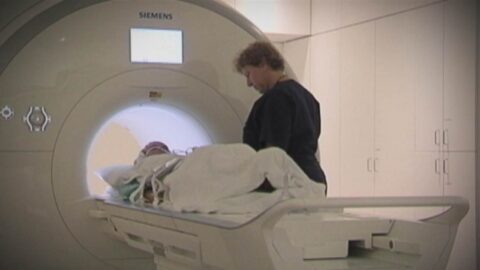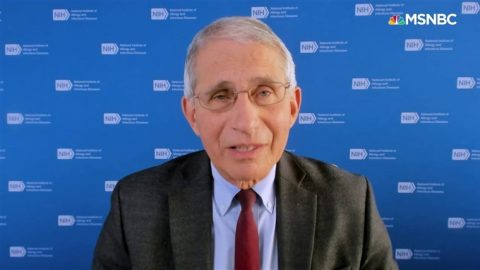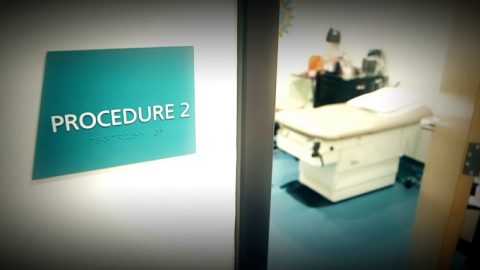Idaho hospitals are so overwhelmed with the surge in coronavirus cases that doctors and nurses have to contact dozens of regional hospitals across the West in hopes of finding places to transfer individual critical patients.
The situation has grown so bad that the Idaho Department of Health and Wellness announced Thursday that the entire state is in a hospital resource crisis, permitting medical facilities to ration health care and triage patients.
Kootenai Health, a hospital in Coeur d’Alene, Idaho, has already converted a conference room into an overflow Covid unit, started paying traveling nurses higher rates and brought in a military medical unit. The hospital received permission from the state to begin rationing care last week. That’s all in response to the Covid surge that in recent weeks has taken over much of Idaho — a state with one of the nation’s lowest vaccination rates.
“It’s just nonstop trying to find placement for these patients and the care that they need,” said Brian Whitlock, the president and CEO of the Idaho Hospital Association, who noted that hospitals across the state are struggling with the same issue. “It really is a minute-by-minute assessment of where beds are open, and hospitals saying we don’t know where we’re going to put the next one.”
The need for ICU bed space is affecting a range of patients: those suffering from Covid, as well as people who have had heart attacks or strokes or were involved in accidents, for instance.
Prior to the pandemic, experts said borders between states in the region were blurry when it came to patient care. While many of the states are known for their beautiful scenery and wide open terrains, the access to critical medical care can be difficult for the small rural towns that pepper its landscape. The easiest access to medical treatment might be across a border, rather than within a state’s boundaries.
Those state boundaries, however, have become a bit starker as hospitals struggle to keep beds open for patients within their own state.
Health leaders in Washington state said that they are attempting to help their neighbors states, but they are keeping a close eye on their own bed space.
“We’ve had to initiate patient placement committees with physicians at our various hospitals to really assess and prioritize — in conversation with these facilities that are wanting to transfer — to really identify who’s at the most risk for higher level of care and what can be managed where they’re at and what cannot be managed where they’re at,” said Peg Currie, the chief operating officer at Providence Health Care in Spokane, Washington, which is a 40-minute drive from Coeur d’Alene and Kootenai Health.
It’s become an ethical challenge, as Washington has been aggressive in its Covid safety measures while Idaho’s state leaders have done little to address the latest surge.
It doesn’t matter what you believe about Covid right now: what matters is that our health care system’s at capacity.
dr. david pate said of idaho
Dr. Doug White, the director of the University of Pittsburgh’s Program on Ethics and Decision Making in Critical Illness, said that while Washington’s health care services may feel a moral obligation to help, the need for action falls to Idaho’s state government.
“Medical practice is regulated at the state level, public health interventions come at the state level, and so in an emergency like this, I do think that the state lines become very important because what we’re seeing is these very stark differences between how Washington state has responded to the pandemic and how Idaho has responded to the pandemic,” he said, noting that Washington’s aggressive safety measures came at some cost to the state.
But the relationships between these hospitals runs deep.
Dr. David Pate, a member of Idaho’s coronavirus task force and the former president and CEO of St. Luke’s Health System in Boise, said that because of how far Idaho’s towns are from metropolitan areas, it was common prior to the pandemic for doctors to send their patients to cities like Spokane, Salt Lake City, Seattle, Portland, Oregon, and other far-flung cities in the region. It often required patients to be taken by plane or helicopter and close coordination between medical facilities.
Now, he said, doctors are being forced to call 30 or more hospitals across multiple states to find a bed for a single patient in hospitals with which they have little to no relationship. Some doctors in Idaho have called as far south as Texas and as far east as Georgia.
“You’re taking seven to eight hours to call a bunch of hospitals to see if one will take your patient who might face a time-sensitive emergency,” Pate said. “Seven to eight hours might mean that patient won’t survive.”
The challenge of transfers added to the pressure for Idaho to establish crisis standards of care, which means doctors can triage patients dependent on bed space availability and health care workers without specific training can be brought in to work in the ICU.
For Idaho’s health leaders, the number of hospital transfers that Kootenai Health had to decline because of the Covid surge crystalized the need to change care standards last week.
A regional transfer hub for patients in urgent need of critical care — typically things like car accidents, heart attacks and strokes — Kootenai Health has had to turn down 392 patient transfer requests in the month of August because of their number of Covid patients. From July to the end of September last year, they turned down 18 patient transfers.
Kootenai Health is not the only hospital that is establishing these new care standards and northern Idaho is not the only part of the state that may be implementing them.
When Idaho declared it would ration care in its northern region last week, the state’s health and welfare director, Dave Jeppesen, called it a “last resort.”
Earlier this week, he said crisis standards of care were “imminent” for hospitals in the rest of the state given that Idaho continues to set new records for hospitalizations and patients in the intensive care unit and on ventilators due to Covid.
“The numbers are increasing at an alarming rate and we do not see a peak in sight,” he said at a briefing on Tuesday.
In his announcement on Thursday, Jeppesen pleaded with Idaho residents, stating that “best way to end crisis standards of care is for more people to get vaccinated.”
“The situation is dire,” he said. We don’t have enough resources to adequately treat the patients in our hospitals, whether you are there for COVID-19 or a heart attack or because of a car accident.”
Under critical standards of care, the state allows health care providers to make difficult decisions about how to allocate and use scarce medical resources. That means some patients could go without treatment, as treatment is saved for those most likely to survive.
Idaho is not alone in pursuing this type of care.
Billings Clinic, a 300-bed hospital in Montana, is considering adopting crisis standards of care as its ICU hits 150 percent capacity. Alaska’s largest hospital, Providence Alaska Medical Center in Anchorage, said Tuesday that based on its number of patients they had been “forced within our hospital to implement crisis standards of care.”
Meanwhile, hospitals in Wyoming that are not normally equipped with pediatric beds are struggling to address a wave of pediatric illnesses.
Eric Boley, the president of the state’s hospital association, said they typically depend on neighboring states to take critically ill kids.
“We really don’t have pediatric beds in our state, so we rely on surrounding states to help us with those,” he said. “And we’re seeing a big uptick in pediatric cases right now.”
It’s a frustration for health care leaders across the West, as they struggle to get this latest surge under control.
With few signs that it will let up any time soon, the region’s health care systems could be stretched to their breaking point in a region of the country that remains highly skeptical of Covid vaccines and mask mandates.
“It doesn’t matter what you believe about Covid right now. What matters is that our health care system’s at capacity,” said Pate, of Idaho’s coronavirus task force. “I’m just asking people, work with us for a month, six weeks — humor us. Be careful, don’t get in a large crowd, wear a mask and please do consider getting vaccinated.”
CORRECTION (Sept. 16, 2021, 3:38 p.m. ET): A previous version of this article mischaracterized how much Kootenai Health is paying travel nurses. A spokesperson said $250 an hour is “in the ballpark,” but would not confirm they are being paid that amount.










Recent Comments